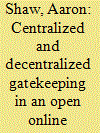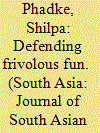|
|
|
Sort Order |
|
|
|
Items / Page
|
|
|
|
|
|
|
| Srl | Item |
| 1 |
ID:
117048


|
|
|
|
|
| Publication |
2012.
|
| Summary/Abstract |
This paper presents a study of gatekeeping in the U.S. political blog "Daily Kos." Open online collectives like Daily Kos use relational mechanisms, such as gatekeeping, to manage organizational boundaries and filter the contributions of participants. However, neither prior theories of gatekeeping nor the existing analyses of open online collectives account for the character or implications of gatekeeping in the Daily Kos community. Using qualitative evidence as well as statistical analysis of a large sample of comment threads on the site from 2008, I argue that gatekeeping on Daily Kos takes centralized and decentralized forms, and that both modes depend critically on relational boundary work among site participants. Centralized gatekeeping proceeds through actions by high-status members of the community. Decentralized gatekeeping, by contrast, consists of more numerous and small-scale interactions between community members, who filter and moderate each other's participation. Both forms of gatekeeping enhance the ability of site leaders and incumbent community members to regulate access to privileges and agenda-setting responsibilities on the site. These findings imply that the egalitarian ethos of open online collectives exists in tension with the mechanisms through which participation and status inequalities emerge among participants. How collectives engaged in mobilization and discursive production resolve this tension will shape the long-term impact of online participation and blogs on the political and public spheres.
|
|
|
|
|
|
|
|
|
|
|
|
|
|
|
|
| 2 |
ID:
171300


|
|
|
|
|
| Summary/Abstract |
Can fun be a serious politics in feminist struggles? That is the question that animates this paper. While claims for the economic and political participation of women have gained increasing legitimacy, the demand for fun may often be seen not just as frivolous, but also as undermining the seriousness of the feminist project itself. The paper engages with three feminist campaigns, two in India and one in Pakistan, that assert women’s rights to occupy the public for fun. The paper refutes critiques that suggest that feminist campaigns to claim public space in the city are illustrative of neo-liberal subjecthood and reflect the birth of new entrepreneurial selves. It also reflects on contemporary feminist debates in India around what counts as feminist, arguing that claims for fun might in fact be central to a feminist politics in the twenty-first century.
|
|
|
|
|
|
|
|
|
|
|
|
|
|
|
|
| 3 |
ID:
178875


|
|
|
|
|
| Summary/Abstract |
This article explores our experiences of conducting feminist interpretive research on the British Army Reserves. The project, which examined the everyday work-Army-life balance challenges that reservists face, and the roles of their partners/spouses in enabling them to fulfil their military commitments, is an example of a potential contribution to the so-called ‘knowledge economy’, where publicly funded research has come to be seen as ‘functional’ for political, military, economic, and social advancement. As feminist interpretive researchers examining an institution that prizes masculinist and functionalist methodologies, instrumentalised knowledge production, and highly formalised ethics approval processes, we faced multiple challenges to how we were able to conduct our research, who we were able to access, and what we were able to say. We show how military assumptions about what constitutes proper ‘research’, bolstered by knowledge economy logics, reinforces gendered power relationships that keep hidden the significant roles women (in our case, the partners/spouses of reservists) play in state security. Accordingly, we argue that the functionalist and masculinist logics interpretive researchers face in the age of the knowledge economy help more in sustaining orthodox modes of knowledge production about militaries and security, and in reinforcing gendered power relations, than they do in advancing knowledge.
|
|
|
|
|
|
|
|
|
|
|
|
|
|
|
|
|
|
|
|
|